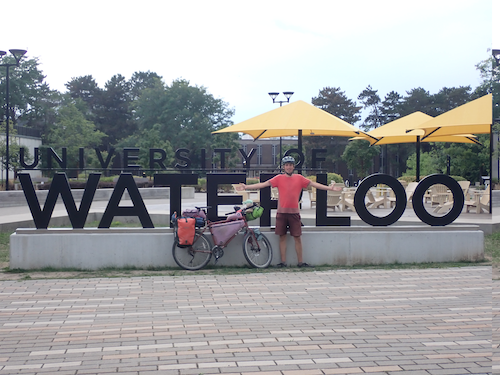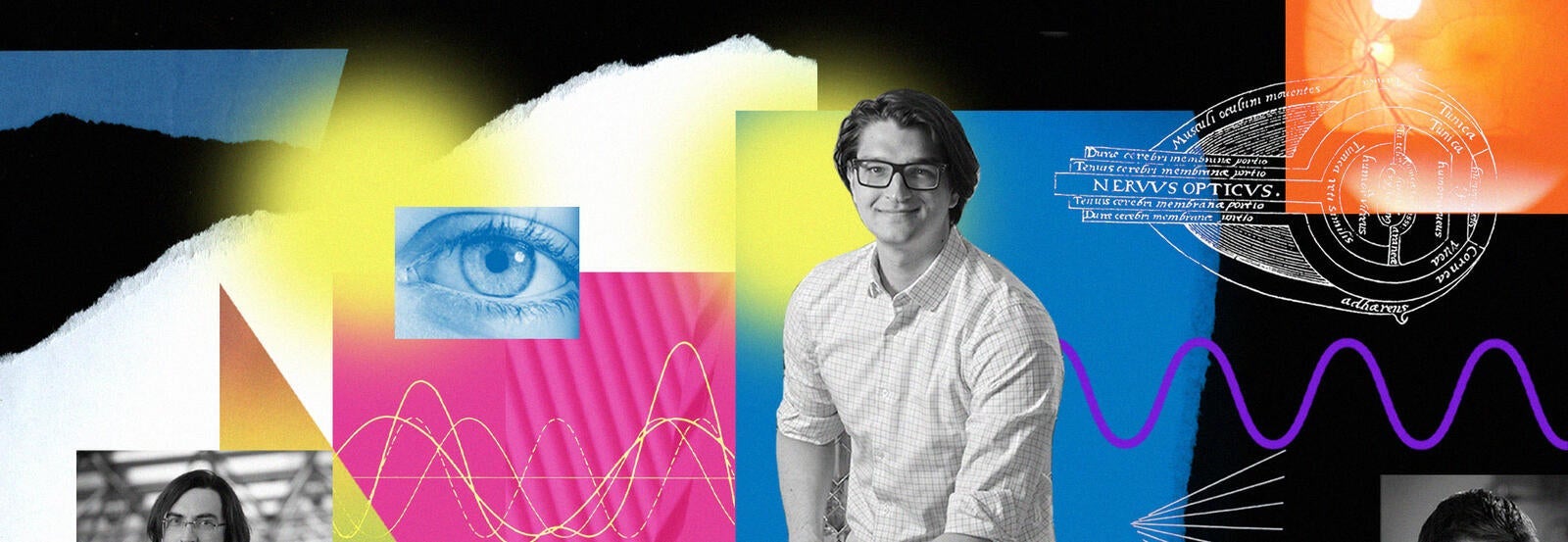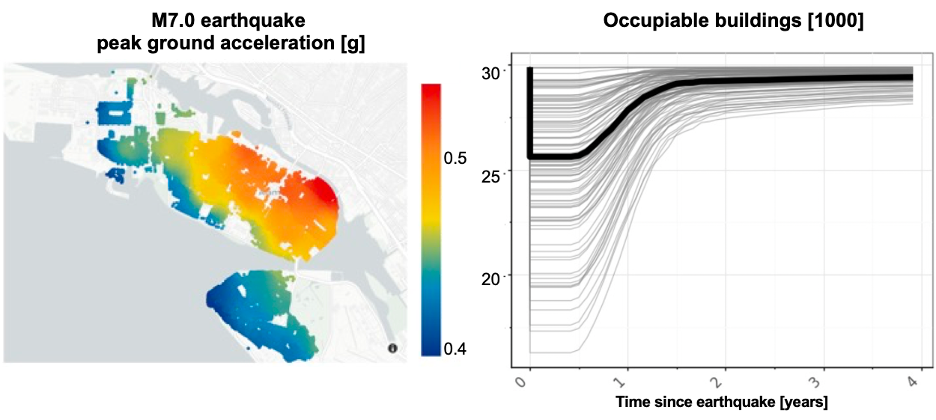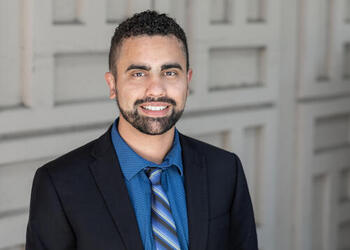Editor:
Brandon Sweet
University Communications
bulletin@uwaterloo.ca
Alumnus visits campus on cross-country bike tour

By Megan McGarry.
When 23-year-old alumnus Steven Ekvall completed his degree in Geological Engineering, he had big plans of going on a big adventure. Maybe hitch-hiking through Europe, or possibly Peru; but this was April 2020 and COVID-19 restrictions limited his ability to travel.
Two years later, the Calgary native has embarked on his big adventure a little closer to home: a cross-country bike tour.
Steven began his journey on May 7, embarking from Victoria, BC with a goal to finish in Newfoundland. Steven is hoping to finish by the end of October.
“The route isn’t really designated, since I’m trying to stay off main highways and stick to trails and logging roads where possible,” said Steven. “But typically, the halfway would be somewhere around Thunder Bay and I’m past that now.”
While attending Waterloo, Steven was always active and biked to school and work but was never what you’d call an avid biker. Leading up to his departure from the west coast, he also didn’t quite have the time for all the training he was hoping for due to the long Calgary winter that extended into April.
His first few days were gruelling but now he’s in a routine of biking around 8 hours a day, from roughly 9:00 a.m. to 5:00 p.m. with energy to spare. “It’s kind of like a full-time job!” he said with a laugh.
On day 103, Steven returned to campus to get a few photos with his bike.
You can follow Steven along his journey on his blog, Steven Cycles Canada.
Seeing the quantum light

By Kayleigh Platz. This article was originally published in the Spring 2022 issue of Waterloo Magazine.
A new device being tested in the University of Waterloo Optometry Clinic may one day help prevent the leading cause of vision loss in older adults – and it all started with a chance conversation among quantum physicists.
Dmitry Pushin, a professor in the department of Physics and Astronomy, was talking to another physicist about his team’s quantum light research when the colleague mentioned that Ben Thompson, a professor in the School of Optometry and Vision Science, was studying macular degeneration and how the eye and brain see light.
Pushin’s team, based at the Institute for Quantum Computing (IQC), had been asking the question: “Can people see quantum light with the naked eye?”
When his research team proved the human eye could indeed see quantum light, they wondered: “What can we do with this?”
Across campus, Thompson and his team were researching eye exams, asking: “How do we compare what people think they see to what they actually see?”
Waterloo's unique IP policy fosters collaboration
For Pushin, this was an opportunity for collaboration because the two research groups were asking similar questions through different lenses.
Waterloo’s culture, the research teams agree, helps foster this type of interdisciplinary research. Its unique intellectual property policy, that allows researchers to own what they invent, encourages people to work together and try out new areas, Pushin says.

Taking this idea of quantum light and macular degeneration back to the lab, Pushin’s team developed a device that allows optometrists to see how the human eye tracks polarized light. A person with healthy eyes can detect polarized light in the form of a blurry spot in their field of vision – a phenomenon known as Haidinger’s brush. This is due to structural properties of the macula, which are compromised in individuals with macular degeneration.
Today, macular degeneration is often diagnosed after irreparable vision loss has occurred. Connor Kapahi (PhD in progress), a PhD student in Physics and Astronomy, and Dusan Sarenac (BASc ’14, PhD ’18), technical lead at IQC’s Transformative Quantum Technologies (TQT) group, built the camera, which is capable of illuminating and imaging a patient’s retina with novel forms of light. The research was funded through TQT which is a Canada First Research Excellence Fund Initiative.
This diagnostic tool is being tested at Waterloo’s Optometry Clinic with the hope that it may one day detect macular degeneration in patients earlier. “Our collaboration is an unusual one, not only because it connects a relatively abstract topic in quantum technology to an established medical field in vision research, but also because it spans continents,” Kapahi says.
Thompson, now based in Hong Kong and running the University’s new Centre for Eye and Vision Research (CEVR), is taking the collaboration international which is significantly improving their ability to test the device on patients.
Opportunities to integrate research attracts top talent
Thompson sees the Waterloo environment as key to creating opportunities for interdisciplinary research because researchers from such different disciplines typically don’t connect at many other universities. Waterloo has an open, collegial culture that actively promotes interdisciplinary collaboration, new ideas and “blue skies” thinking, he says. This environment makes it possible to identify new connections with researchers from very different disciplines.
Interdisciplinary research is powerful but it poses many challenges such as communication, confidence in moving outside of your comfort zone and trusting collaborators outside your discipline, Thompson says.
"Early exposure to successful interdisciplinary research allows trainees to overcome these fundamental challenges and experience the exhilaration of being involved in the generation of new ideas and technologies that would not have been possible without combined expertise. This, in turn, lays the foundation for trainees to incorporate interdisciplinary projects into their future careers.”
The cutting-edge invention is attracting talent to Waterloo. During the research phase, Thompson welcomed Andrew Silva, a Postdoctoral Fellow in the School of Optometry and Vision Science to the team. Silva was instantly engaged in the research that extended beyond silos and the usual academic restriction. Learning to think in a collaborative and interdisciplinary way early on helps shape your focus and future as a researcher, Thompson said.
“Something extra can be found through collaboration,” Kapahi says. “By collaborating across fields that have historically been separate, researchers can find opportunities to solve problems that their colleagues might have thought intractable. I see interdisciplinary collaboration as a cornerstone of the future of academic research.”
Modelling disaster recovery

Post-earthquake housing recovery assessment for Alameda (CA)
This article was originally published on the Systems Design Engineering website.

After a disaster strikes, the ability of individuals to recover is shaped by the many inter-connected systems that make up a community.
Exploring this complex problem is the goal of Rodrigo Costa, who recently joined the Department of Systems Design Engineering (SYDE) as an assistant professor. His research integrates knowledge from engineering, planning, and social sciences to understand how extreme natural events impact communities. At the core of the issue is how the interaction of systems can worsen disaster risk and inequalities.
“Urban communities are, by definition, a system of systems. You have your infrastructure systems, economic systems, social systems, political systems, and many others. Thus, to understand how extreme events, like an earthquake, flood, or wildfire, disrupt urban communities it is essential to approach this problem from a system of systems perspective,” said Costa. “I am excited to join Waterloo because SYDE has the perfect environment and community to foster this perspective.”
Modelling how the systems interact at a community level can help residents and governments prepare for and make decisions during disaster recovery. For example, Costa’s research has modelled the distribution of housing infrastructure in a post-disaster scenario that incorporates social and economic factors. The results highlight inequitable recovery rates across socioeconomic statuses and strategies to improve make recovery more equitable.
“While homes are being repaired, displaced residents may compete for temporary housing with out-of-town reconstruction workers, raising rental prices,” explained Costa. “This one of the many barriers for residents at lower socioeconomics statuses. With my research, I identify these potential barriers before a disaster strikes so we are better prepare to mitigate their negative impacts during recovery.”
Costa joins the University of Waterloo from Stanford University, where he held a post-doctoral scholar position at the Stanford Urban Resilience Initiative. He earned his PhD in Civil Engineering with a focus on earthquake engineering from The University of British Columbia. He received the Earthquake Engineering Research Institute’s 2021 Graduate Student Paper Award for his paper “Agent-based model for post-earthquake housing recovery" published in the journal Earthquake Spectra.
Costa’s work is described on his personal website.
Elevator maintenance has its ups and downs
Plant Operations has announced a series of elevator service interruptions relating to repairs and maintenance in buildings across campus. The dates, times and locations are as follows:
- Engineering 7, Monday, August 22, 8:00 a.m. to 4:00 p.m.;
- Physics, Tuesday, August 23, 12 noon to 4:00 p.m.;
- Applied Health Sciences, Tuesday, August 23, 12 noon to 4:00 p.m.;
- Arts Library, Wednesday, August 24, 8:00 a.m. to 12 noon;
- Douglas Wright Engineering (DWE), Wednesday, August 24, 12:00 noon to 4:00 p.m.;
- Engineering 5, Thursday, August 25, 8:00 a.m. to 4:00 p.m.;
- UWP-Beck Hall, Thursday, August 25, 8:00 a.m. to 12 noon;
- Quantum-Nano Centre, Thursday, August 25, 12 noon to 4:00 p.m.; and
- School of Pharmacy (PHR), Friday, August 26, 8:00 a.m. to 12 noon.
During the maintenance period, elevators will be taken out of service one at a time in the affected buildings.
Upcoming office closure
The Health Services (HS) building will be closed from 2:00 p.m. to 4:30 p.m. on Friday, August 19 while the staff there attend training activities. Counselling Services in Needles Hall will continue operating during their regular hours.
Link of the day
When and Where to get support
Students can visit the Student Success Office online for supports including academic development, international student resources, immigration consulting, leadership development, exchange and study abroad, and opportunities to get involved.
Instructors looking for targeted support for developing online components for blended learning courses, transitioning remote to fully online courses, revising current online courses, and more please visit Agile Development | Centre for Extended Learning | University of Waterloo (uwaterloo.ca).
Instructors can visit the Keep Learning website to get support on adapting their teaching and learning plans for an online environment.
Course templates are available within your course in LEARN to help you build and edit your content and assignment pages quickly.
The following workshops, webinars, and events are offered by the KL team (CTE, CEL, ITMS, LIB):
-
Scholarship of Teaching and Learning (SoTL) Methods – self-directed, continuous self-enrollment course in LEARN.
-
Independent Blended Course Design (iBlend) - self-directed, continuous self-enrollment course in LEARN.
-
Copyright Overview for Waterloo Instructors and Staff - self-directed, continuous self-enrollment course in LEARN.
-
Independent Remote Course Design Essentials (iReCoDE) - self-directed, continuous self-enrollment course in LEARN.
-
Supporting Student Mental Health (for Instructors) – self-directed, continuous self-enrollment course in LEARN.
Supports are available for employees returning to campus. Visit IST’s Hybrid Work and Technology guidelines and workplace protocols to assist with the transition.
The Writing and Communication Centre has in-person and virtual services to support grad and undergrad students, postdocs and faculty with any writing or communication project. Services include one-to-one appointments, drop-ins at Dana Porter Library, online workshops, writing groups, English conversation practice, and custom in-class workshops.
Co-op students can get help finding a job and find supports to successfully work remotely, develop new skills, access wellness and career information, and contact a co-op or career advisor.
The Centre for Career Action (CCA) has services and programs to support undergrads, grad students, postdocs, alumni, and employees in figuring out what they value, what they’re good at, and how to access meaningful work, co-op, volunteer, or graduate/professional school opportunities. Questions about CCA's services? Live chat, call 519-888-4047, or stop by our front desk in the Tatham Centre 8:30 a.m. to 4:30 p.m., Monday to Friday.
Drop-in to Warrior Virtual Study Halls on Wednesdays from 5:30 p.m. to 7:00 p.m. Come together in this virtual space to set goals and work independently or in groups each week.
Renison's English Language Institute continues to offer virtual events and workshops to help students practice their English language skills.
If you feel overwhelmed or anxious and need to talk to somebody, please contact the University’s Campus Wellness services, either Health Services or Counselling Services. You can also contact the University's Centre for Mental Health Research and Treatment. Good2Talk is a post-secondary student helpline available to all students.
The Library is open with expanded hours for access to book stacks, drop-in individual study space, bookable group study rooms, drop-in access to computers and printers, book pick-up services and IST Help Desk support. Librarian consultations, Special Collections & Archives and the Geospatial Centre are available by appointment. Full details on current services and hours are available on the Library’s COVID-19 Update webpage.
The Faculty Association of the University of Waterloo (FAUW) continues to advocate for its members. Check out the FAUW blog for more information.
The University of Waterloo Staff Association (UWSA) continues to advocate for its members. Check out the UWSA blog for more information.
The Sexual Violence Prevention and Response Office (SVPRO) supports all members of the University of Waterloo campus community who have experienced, or been impacted, by sexual violence. This includes all students, staff, faculty and visitors on the main campus, the satellite campuses, and at the affiliated and federated Waterloo Institutes and Colleges. For support, email: svpro@uwaterloo.ca or visit the SVPRO website.
The Office of Indigenous Relations is a central hub that provides guidance, support, and resources to all Indigenous and non-Indigenous campus community members and oversees the University's Indigenization strategy.
The Waterloo Indigenous Student Centre, based at St. Paul’s University College, provides support and resources for Indigenous students, and educational outreach programs for the broader community, including lectures, and events.
WUSA supports for students:
Peer support - MATES, Glow Centre, RAISE, Women’s Centre - Click on one of the links to book an appointment either in person or online for the term.
Food Support Service food hampers are currently available from the Turnkey Desk 24/7 in the Student Life Centre. Drop-off locations are also open again in SLC, DC, DP, SCH, and all residences.
Co-op Connection all available online.
Centre for Academic Policy Support - CAPS is here to assist Waterloo undergraduates throughout their experience in navigating academic policy in the instances of filing petitions, grievances and appeals. Please contact them at caps@wusa.ca.
WUSA Student Legal Protection Program - Seeking legal counsel can be intimidating, especially if it’s your first time facing a legal issue. The legal assistance helpline provides quick access to legal advice in any area of law, including criminal. Just call 1-833-202-4571.
Empower Me is a confidential mental health and wellness service that connects students with qualified counsellors 24/7. They can be reached at 1-833-628-5589.
GSA-UW supports for graduate students:
The Graduate Student Association (GSA-UW) supports students’ academic and social experience and promotes their well-being.
Advising and Support - The GSA advises graduate students experiencing challenges and can help with navigating university policies & filing a grievance, appeal, or petition.
Mental Health covered by the Health Plan - The GSA Health Plan now has an 80 per cent coverage rate (up to $800/year) for Mental Health Practitioners. Your plan includes coverage for psychologists, registered social workers, psychotherapists, and clinical counselors.
Dental Care - The GSA Dental Plan covers 60 to 70 per cent of your dental costs and by visiting dental professionals who are members of the Studentcare Networks, you can receive an additional 20 to 30 per cent coverage.
Student Legal Protection Program - Your GSA fees give you access to unlimited legal advice, accessible via a toll-free helpline: +1-833-202-4571. This advice covers topics including housing disputes, employment disputes, and disputes with an academic institution.
The Graduate House: Open Monday to Tuesday 11:30 a.m. to 7:00 p.m. and Wednesday to Friday 11:30 a.m. to 9:00 p.m. We’re open to all students, faculty, staff, and community members. The Graduate House is a community space run by the GSA-UW. We’re adding new items to the menu. Graduate students who paid their fees can get discounts and free coffee.
When and Where (but mostly when)
Warriors vs. Laurier Blood Donation Battle. Join our “Waterloo Warriors” team on the Blood.ca website or app. #ItsInYouToGive
Warriors Youth Summer Day Camps, July 4 to September 2. Open to boys and girls age 5-18. Baseball, Basketball, Football, Hockey, Multi-Sport and Games & Volleyball. Register today.
Warriors Game Day Tickets and Season Passes, on sale now. Cheer on your Warriors W/M Basketball, Football W/M Hockey and W/M Volleyball teams at home during the 2022-23 season. Purchase today.
NEW - Warriors Men’s Basketball vs. Ferris State Bulldogs, Friday, August 26, 6:00 p.m., Carl Totzke Court, PAC. Purchase your tickets today.
NEW - Labour Day holiday, Monday, September 5, most University operations closed.
Deadline to register for Centre for Extended Learning (CEL) "Getting Ready to Facilitate Online Courses: TA Training – Fall 2022" course, Sunday, September 11.